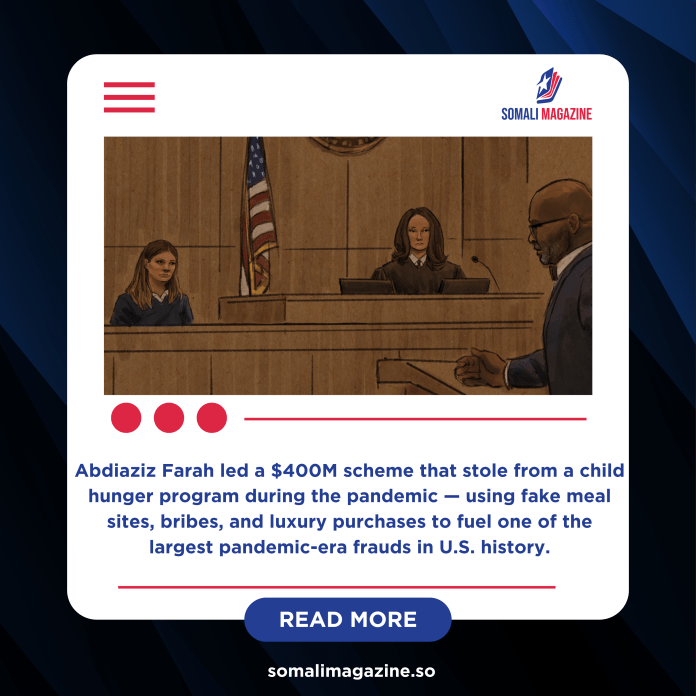Facebook Twitter (X) Instagram Somali Magazine - People's Magazine
Abdiaziz Shafii Farah, a Somali-American businessman, has been sentenced to 28 years in prison for leading one of the biggest COVID-19 relief fraud schemes in U.S. history. He was convicted of stealing tens of millions of dollars that were meant to feed children during the pandemic.
Farah, 36, was also ordered to repay $47.9 million and will be on supervised release for three years after his prison term. His sentence is the longest so far in the “Feeding Our Future” case and one of the longest white-collar sentences in Minnesota’s history.
Federal prosecutors say Farah played a key leadership role in the scam, which involved dozens of people across the state. The fraud targeted a government program meant to provide meals to low-income children when schools were closed due to COVID-19.
Farah ran multiple food sites under his company, Empire Cuisine & Market. He claimed to have served 18 million meals, but investigators found that many of these sites were empty buildings or vacant lots. In reality, few—if any—meals were actually provided.
Prosecutors said Farah wasn’t just involved early on but actively recruited others to join the scheme, becoming a central figure in the operation.
In 2024, a jury found Farah guilty on 23 counts, including wire fraud, money laundering, and bribery. Court documents revealed that Farah personally stole over $8 million—more than anyone else in the scheme. He used the stolen money to buy luxury cars, properties in Minnesota and Kentucky, and even a 12-story apartment building in Nairobi, Kenya.
After authorities seized his passport, Farah tried to escape. He applied for a new passport by claiming the original was lost and booked a one-way ticket to Kenya. He was arrested before he could flee.
At his sentencing, U.S. District Judge Nancy Brasel said Farah’s crimes showed “pure, unmitigated greed” and called the fraud “breathtakingly elaborate.” She also reminded him that the U.S. had given him a home, education, and opportunity—but he repaid it with fraud.
Farah had received public housing assistance, a full college scholarship funded by UnitedHealth, and held jobs in Minnesota’s government before turning to fraud.
During his court appearance, Farah tearfully apologized, saying he had hurt his family and community. “I destroyed my family structure,” he said. “I let down the state and judicial system that saved me from a refugee camp.”
But Judge Brasel and prosecutors noted that his apology focused more on what happened after the fraud—specifically, his attempt to bribe a juror.
In June 2024, near the end of his trial, Farah and four others—including his brothers—tried to bribe a juror by delivering $120,000 in cash to her home. The juror reported the bribe and was removed from the case, and the rest of the jury was placed under protection. Farah has since pleaded guilty to jury tampering and faces an additional sentence for that crime.
Federal officials say the overall fraud may total between $300 million and $400 million, making it the largest pandemic-related food program scam in the U.S. Investigators have recovered between $60 million and $75 million, but much of the stolen money—especially funds sent overseas—may never be recovered.
Farah is one of over 70 people charged in the case. Two others considered top figures in the scheme—Aimee Bock, the founder of Feeding Our Future, and Salim Said—were also convicted in March 2025 but haven’t yet been sentenced.
On the same day Farah was sentenced, prosecutors charged another person—Hussein Mohamed Farah, the head of New Vision Foundation—for allegedly submitting fake meal counts to get $2.7 million from the same program.
Officials say the fraud deeply damaged public trust and hurt the Somali-American community. “He didn’t want the American dream,” said Acting U.S. Attorney Joseph H. Thompson. “He wanted the money.”

